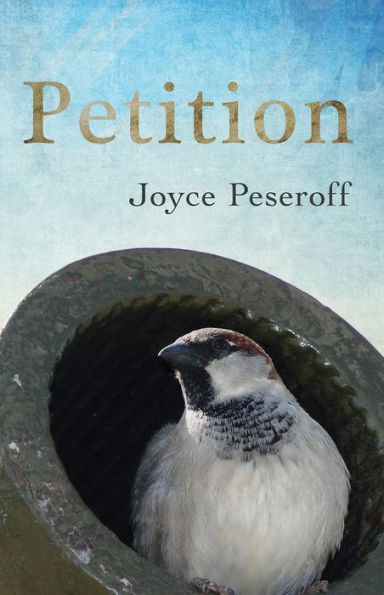 In her new book of poems, Petition, Joyce Peseroff situates herself between the ordinary and the ecstatic, engaged with the every day experience of encounters and surprises. But as a reader of her work for years, I was struck by Peseroff’s emphases on the social world and a changing topography of cultural interests, from depicting those who live precariously in our society to imagining a world in which astronauts reinvent the cosmos, and onto the searing poems about separation and loss. As Gail Mazur has written, “The poems in Petition recognize how helpless we are in our desire to repair the world.” And this is an apt remark on the opening title poem in which the poet expresses in the language of biblical imperatives the need to correct all the things that our generation has done in error. As Peseroff has stated, “It’s a kind of plea — let’s try it again. Maybe this time we will get it right.” The incantatory poem opens:
In her new book of poems, Petition, Joyce Peseroff situates herself between the ordinary and the ecstatic, engaged with the every day experience of encounters and surprises. But as a reader of her work for years, I was struck by Peseroff’s emphases on the social world and a changing topography of cultural interests, from depicting those who live precariously in our society to imagining a world in which astronauts reinvent the cosmos, and onto the searing poems about separation and loss. As Gail Mazur has written, “The poems in Petition recognize how helpless we are in our desire to repair the world.” And this is an apt remark on the opening title poem in which the poet expresses in the language of biblical imperatives the need to correct all the things that our generation has done in error. As Peseroff has stated, “It’s a kind of plea — let’s try it again. Maybe this time we will get it right.” The incantatory poem opens:
Give the wealth back to those we stole it from.
Give the land back to those we stole it from.
Give our shotguns to those we took the land from.
Maybe they’ll split the barrels into irrigation pipes,
maybe they’ll mill the stocks for bookends
for the books by those we took language from.
This poem seeks to examine first causes, speculating on the origins of the fall — a moral darkness that has shadowed us since the beginning of time. The quiet irony here is that if eternity were to return to us, the created world and the names of things would be erased and restarted from scratch, which subtly undermines the very process of giving by taking things back. These are the metaphorical bookends Peseroff constructs to bracket her world. As long as we are mortal, eternity is out of our reach. The reiteration of the word “give” is psalm-like and iridescent:
Give us time to restore the forest and the sea
we filtered of whales, codfish, and pink dolphins.
Give us eternity again, we’ll set things right.
When I first read these lines, I heard an echo of Peseroff’s close friend, the late Jane Kenyon, who wrote about the rightness of placed things when it came to witnessing the small miracles of everyday life. “Petition” is an elegy for our world in which we mourn the past through the future. All we can ask of eternity is only to return to the world and perhaps reset it as it was — to eventually “set things right.”
The poems give us a sense of placement so that the poet can navigate through even the most quixotic of their situations, such as “Ending with the Corpse Pose” or “Horse on a Plane.” One throws one’s self into this unknown paradise with a delight that overcomes the bleakness ahead. This is true of the archeological poem, “Poem Beginning with Items from the Vienna Museum of Contraception and Abortion,” that traces the horror of what women had to endure to deter a pregnancy. As she writes:
Rat poison.
A forty-pound rock.
Bundles of herbs.
A grapevine stalk.
Wire clothes hangers.
A scalding bath.
Did you tumble down
stairs or a granite cliff?
Questions permeate these poems, since we can live only into the answers. Known for her elegies, Peseroff offers some that are somber and consolatory, some resistant to consolation such as “Visiting My Parents’ Graves” with her typical wit and disarming candor:
I know they’re not here,
but they chose this place
as they did their condo,
and how wrong not to visit
as I did the white leather
sectional and plasma
TV they denied themselves
until years understood
to be their last …
On another note, I admire the elegy, “The High Trees,” for Donald Hall and Jane Kenyon on the occasion of Hall’s burial next to his wife’s grave. The two penultimate stanzas read:
… Blackwater dam,
Newfound Lake,
acres of sweet corn planted in succession so none go without, seven for a week —
hayfield, hayfield, hayfield, a cemetery called Homeland, tiny airport on
Winnipesaukee’s shore, outboards rooster tailing it across the bay.
No more
worry over what I’d missed in conversation, or two layers of sweatpants
in July. The granite stone bulked three times larger in my memory, twenty years
since we stood astonished, red faced, terrified, bitter, howling or silent .
Jane’s brother pointed, look how high the trees over their grave have grown.
The long lines are laid out and with an urgency to breathe life in as if these “spots of time” will never be seen again, the language hovering like the high trees that ascend regardless of the mortal wounds they sustained in the earth.
With all the force of her intellect, Peseroff finds the uncanny in the quotidian; the uncanny is colored by accents that are utterly fresh, and the humanity in the quotidian is illuminated. As she recently commented on discovering a love for poems while in college: “I just was entranced by what they did with language, how they were able to compress so much into so little.” As an example of compression, I turn to the poem “The Astronauts” which meditates on the biography of Cecilia Payne-Gaposchkin:
Who charted
more stars than anyone in her Harvard
observatory, lived down the street
where my daughter fought
first to root then to be free
of Daddy and me.
The aggregated surface of the poem is a form that affirms the constant struggle to find meaning in a disjointed world. There is also a wonderful wildness that reverses the laws of the universe:
If I’m the sun, then people I love
whirl past me in elliptical orbits
like comets, once in a hundred years.
And if I’m a planet, each is a moon
with a dark side. Crooked in the arm
of a galaxy I spiral at light speed
but since matter’s in motion I
appear to be sitting still …
Always restless and shifting into new forms, Peseroff spirals at light speed with the sun and planets where nothing is tethered. Everything is open to interpretation. It is only in acknowledging the cognitive dissonance between hope and despair that she is able to conjure a haunting conclusion that reminds me of a Hopkins quotation: “Whatever you look hard at begins to look back at you.”
In a poem like “Poem for Young Men Registered as Unaccompanied Minors Seeking Asylum, October 2015,” the poet not only empathizes with the plight of migrants,
she identifies with them:
Like thoroughbreds, they’re all given
the same birthday, like yesterday’s
frisking colts they don’t know why
they were born to run far and fast,
tracked to the edge of the world
without a brother or sister, into a trailer
onto a ship, locked up and cross-tied.
She carves out this stanza with anger and despair, exposing the brutality of those overseeing the border. This is what our government does unbeknown to us —treating the migrants inhumanely.
The young girl who finds the body
missing its front legs, haunches filleted
shakes the air with screams …
 Perhaps the most wrenching of all is the plight of the children, and the older boys who claim to be seventeen rather than eighteen, so they may still be protected “by law or covenant.” In the end, the children and parents are separated with no way to find one another. It is this line, “No child can unsee what he’s seen,” that summarizes the horrors that these separated children must endure.
Perhaps the most wrenching of all is the plight of the children, and the older boys who claim to be seventeen rather than eighteen, so they may still be protected “by law or covenant.” In the end, the children and parents are separated with no way to find one another. It is this line, “No child can unsee what he’s seen,” that summarizes the horrors that these separated children must endure.
Similarly in the poem “Missing Hiker Kept Journal of her Ordeal,” which sprang from a newspaper headline, Peseroff looks for the hiker as if she could do something to save her. She can only imagine what happened to her and asks herself: “can I understand the pain of others only by feeling pain which I hate?” Here negative capability turns on the poet with a ruthlessness that demands honesty without giving in to self-indulgence; rather it exposes the risk inherent in empathy.
Finally, in the last poem, “Irish Music,” love surfaces in a moving portrait of companions who accept the limitations before them, but nevertheless stretch past them with a measure of hope.
“. ..a sweet woman, who loves Irish
music — and [he] holds her hand
as long as it needed to be held.
[Published by Carnegie University Press on November 7, 2020, 80 pages, $15.95 paperback]